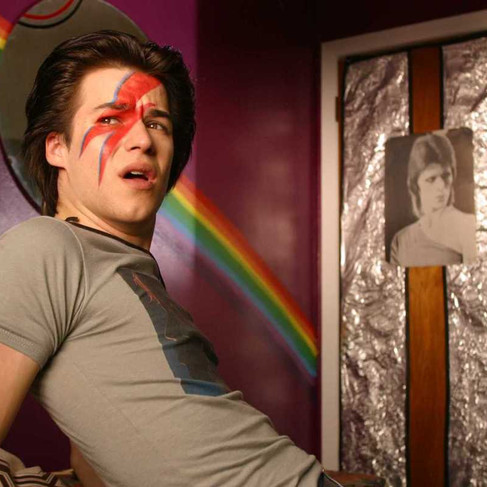Eccentric Family Portraits In Cinema
- Bulut Reyhanoğluy

- Feb 10, 2022
- 5 min read
As the world changes at a dramatic pace, it’s only inevitable that the concept of family changes and transforms along with it. Global statistics show that fewer people are getting married and having fewer kids, if any. The number of divorces is also on the rise. More people are either living by themselves or with someone, or get married more than once, creating step families. In short, the traditional concept of family, comprising a man, a woman, and their biological or adopted children, is no longer the sole recognized norm in society. I looked for the reflections of this shift in cinema and compiled five movies which tell special stories that have touched my heart or made a lasting impression on me. These movies show us that even the most ordinary things can be extraordinary and that the most extraordinary things don’t actually fall far from the norm. The concept of family may vary from one society and country to others, but the essential elements that make us, us remain the same. In the end, we are all reflections of each other. Maybe this is the most important message offered by these films.
1- Little Miss Sunshine

Now that I’m making a list of “non-traditional family films,” I can’t skip the Hoovers, one of my favourite families in cinema. The Hoovers are an ordinary modern American family; however, they are in constant conflict with one another. A father who sees life only as winning or losing; a porn addicted, womanizer, drug abusing grandfather; a son who never talks and always looks upset; an uncle who attempted suicide when he got rejected by the woman he loves; a little girl who believes that she’ll be loved by her family if she wins a beauty pageant; and a mother struggling to keep this family together…

The family hops in a van and hits the road to take Olive to the beauty pageant but, for them, this journey will be an adventure in which they will explore what it really means to be family. Throughout their trip, we see how the ordinary-looking life of the Hoover family actually is extraordinary, candid, and joyful. It also makes us see that we’re not really that different from each other. While watching the movie, you get to choose your own hero. Considering today’s game shows and social media frenzy, the film bears witness to the victory of sincerity rather than fiction while celebrating the victory of losing. I think the film’s simple, naive, unassuming yet honest narrative will touch everyone’s hearts.
2- The Wedding Banquet
The generation after the ‘90s was introduced to Ang Lee with Brokeback Mountain. I think I first heard about him when I watched The Wedding Banquet (1993) which I first watched at Atlas Sineması in Beyoğlu and then added to my archive after buying a VHS cassette at London Virgin. Back then, the winds of change were blowing across Turkey. We had many innovations and had begun to transition into a modern family structure as many of my friends were moving out of their family house and adopting a new lifestyle. Around that time, the influences of a Chinese family on their children bore stark similarities with the traditional Turkish family.

The film tells the story of Wei-Tung, a successful businessman who lives with his boyfriend Simon in Manhattan and hides his homosexual identity from his family in Taiwan. His story exhibits the concept of family as interpreted by the East and the West, including inner family settlements. Believing that their son is of the age to marry, his family starts trying various tactics. His parents register him to a marriage service, their only complaint: their son never likes anyone. Wei-Tung fills out the forms with high demands so that they cannot find him a proper partner. When one day, they find him a partner, he has nothing to do but panic. That is when Wei-Wei enters their life; she is afraid of being deported. Wei-Tung and WeiWei decide to get married, just on paper. So that they can satisfy Wei-Tung’s family and Wei-Wei can get a green card. However, their perfect plan is turned upside down when WeiTung’s parents decide to visit from Taiwan for the wedding. My favourite scene in the film is the conversation between Wei-Tung’s father and Simon. It’s a very special moment because it has a candid feeling which shows that sometimes the person you find the most distant to yourself is the person who could understand you the most.
3- C.R.A.Z.Y.

Zach is the youngest of five sons in a conservative family from Montreal. His devout mother, Laurianne, believes that her son, born on the same day as Jesus, has healing powers. His father, Gervais, a real music enthusiast, has named his children so that their initials form the word "Crazy", the classic song by Patsy Cline. Because of Zach’s interest in dolls and women's clothing, his father worries about the possibility of his son being gay while his mother thinks that he is very emotional.
Actually, the situation is worrisome for Zach as he tries to embrace his homosexuality and his beloved but disapproving father while dealing with his macho siblings, who are the opposite in character. To earn the love and respect of his father, Zach goes all the way to Jerusalem and finds solace in the music of David Bowie, Pink Floyd, and The Rolling Stones. Nobody is born to a family of their choice; however, those who succeed in the end are those who find ways to express themselves and make themselves accepted. Zach is one of them.
4- The Kids Are All Right

This film is a witty portrait of postmodern family life. It is a film actually marriage itself, an institution full of universal difficulties, although it may seem like it describes a gay marriage. Annette Bening and Julianne Moore play Nic and Jules, a Los Angeles couple with two children born through artificial insemination. Both mothers give birth, and the children are siblings because they use the same anonymous sperm donor. Nic is a doctor and Jules is a gardener. This upper-middle class couple, like many couples, is going through a minor midlife crisis. The stable home life of the family is turned upside down as their adolescent children demand to meet their fathers. The boys track down their father eventually meet him, Paul, and plan to introduce him to their mothers. Leaving the role of parents as an insignificant detail and thus redefining the concept of family, the film tells the audience that there is no need to be a “traditional” family in order to experience familial sensations.
5- All About My Mother

This film is a witty portrait of postmodern family life. It is a film actually marriage itself, an institution full of universal difficulties, although it may seem like it describes a gay marriage. Annette Bening and Julianne Moore play Nic and Jules, a Los Angeles couple with two children born through artificial insemination. Both mothers give birth, and the children are siblings because they use the same anonymous sperm donor. Nic is a doctor and Jules is a gardener. This upper-middle class couple, like many couples, is going through a minor midlife crisis. The stable home life of the family is turned upside down as their adolescent children demand to meet their fathers. The boys track down their father eventually meet him, Paul, and plan to introduce him to their mothers. Leaving the role of parents as an insignificant detail and thus redefining the concept of family, the film tells the audience that there is no need to be a “traditional” family in order to experience familial sensations.




Comments